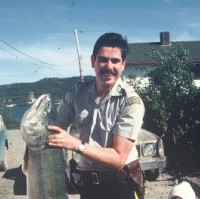When my wife and I met with our advisor, Bryson, our chat turned to his recent Yukon trip, which caused flashbacks to our time in Atlin, BC. In 1981, I was transferred from Campbell River to be the NCO (Non-Commissioned Officer) in charge of the Atlin RCMP detachment, a one-man post, for two years.
The “Switzerland of the North” is in BC’s far northwest corner, 190 km south of Whitehorse. Cassiar, the nearest BC community, is 300 miles (480 km) away, but Juneau, Alaska, is only 110 km away, directly across snow-capped mountains and glaciers. Atlin Lake is BC’s largest natural lake.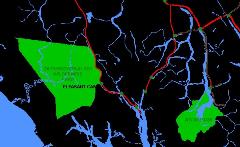
The area is home to the Taku River Tlingit First Nation, with about 100 living in Atlin. In 1898, a discovery 9 km from Atlin started a gold rush, which swelled the population to 10,000. By 1981, the population was 300 in the winter and 900 in the summer. Placer mining still goes on in various creeks, with significant gold and the occasional sizable nuggets still found.
With our daughters, ages 5 and 3, we drove to Port Hardy, overnighted, and then sailed all day on a BC ferry to Prince Rupert. With my BC commanders in Prince Rupert 1,350 km away, my police support came from the Yukon RCMP. After two days in Prince Rupert, we boarded an Alaska state ferry. Two more days of sailing, with stops at little Alaskan villages, finished at Skagway, Alaska. Built in 1978, gravel Highway 2 took us into Dead Horse Gulch, up White Pass, along Bennett Lake to Carcross, then to Whitehorse. After two days of police and personal business in Whitehorse, it was 100 paved kms on the Alaska Highway, and a right turn at Jake’s Corner (population 10) onto the Atlin Road for the final 100 km of gravel road.
Atlin is “unincorporated” (no local government): it is not a village, town, municipality, or part of a regional district. In 1981, there were two very small grocery stores, a general store, a hotel/bar, a BC Liquor store, and a gas station/repair shop. Diesel generation supplied local electricity, and drinking water from the lake was delivered or obtained from wells.
Septic tanks were typical but outhouses were common. Wood stoves heated many homes, often with an oil furnace backup. Twice a week, a delivery service ran to and from Whitehorse. Red Cross Outpost nurses tended to medical needs. Often, usually in the middle of night it seemed, they acted as vets, extracting porcupine quills from tourists’ dogs. A new elementary school opened the fall we arrived. High school students were boarded out in Whitehorse (returning home during school breaks) or were occasionally home-schooled.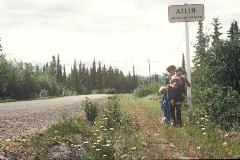
Volunteers operated the fire department, search and rescue, historical society, curling/community clubs, etc. The Atlin Broadcasting Society raised funds to have radio/TV (CBC North) transmitted from Whitehorse via a tower on White Mountain, as the CBC did not provide these services.
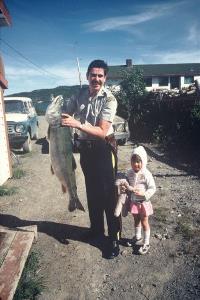
The “Mountie’s wife” spent more time in Atlin than the officers did, as we would have to go back for court or elsewhere for various reasons. My wife would feed prisoners, and answer the radio, phone, and the door during my patrols. When she was out and about, people would tell her things they did not wish to tell “the Mountie,” but knew full well that it would get to me. They told us what we needed to know. Things would happen that did not seem to make sense, or no one “saw” anything. Later, in a roundabout way, the history of the players involved would be revealed and perspective gained. Northern rules.
The RCMP phased out one-man posts (Atlin went to three). Years later, to recognize the spouses’ many (and unpaid) contributions in isolated tiny posts, the force created and presented approximately 500 “Second Man” awards (a silver RCMP crested broach with a Second Man ribbon). My wife’s was presented by the RCMP’s BC Commander at a formal ceremony at the provincial headquarters.
It is said about Atlin and the North: “When times are good, you don’t want to leave, but when times are bad, you can’t afford to!” After many adventures, our Atlin time was up in the summer of 1983. From the sublime to the ridiculous; I was posted to Vancouver. ■

The “Switzerland of the North” is in BC’s far northwest corner, 190 km south of Whitehorse. Cassiar, the nearest BC community, is 300 miles (480 km) away, but Juneau, Alaska, is only 110 km away, directly across snow-capped mountains and glaciers. Atlin Lake is BC’s largest natural lake.

The area is home to the Taku River Tlingit First Nation, with about 100 living in Atlin. In 1898, a discovery 9 km from Atlin started a gold rush, which swelled the population to 10,000. By 1981, the population was 300 in the winter and 900 in the summer. Placer mining still goes on in various creeks, with significant gold and the occasional sizable nuggets still found.
With our daughters, ages 5 and 3, we drove to Port Hardy, overnighted, and then sailed all day on a BC ferry to Prince Rupert. With my BC commanders in Prince Rupert 1,350 km away, my police support came from the Yukon RCMP. After two days in Prince Rupert, we boarded an Alaska state ferry. Two more days of sailing, with stops at little Alaskan villages, finished at Skagway, Alaska. Built in 1978, gravel Highway 2 took us into Dead Horse Gulch, up White Pass, along Bennett Lake to Carcross, then to Whitehorse. After two days of police and personal business in Whitehorse, it was 100 paved kms on the Alaska Highway, and a right turn at Jake’s Corner (population 10) onto the Atlin Road for the final 100 km of gravel road.
Atlin is “unincorporated” (no local government): it is not a village, town, municipality, or part of a regional district. In 1981, there were two very small grocery stores, a general store, a hotel/bar, a BC Liquor store, and a gas station/repair shop. Diesel generation supplied local electricity, and drinking water from the lake was delivered or obtained from wells.
Septic tanks were typical but outhouses were common. Wood stoves heated many homes, often with an oil furnace backup. Twice a week, a delivery service ran to and from Whitehorse. Red Cross Outpost nurses tended to medical needs. Often, usually in the middle of night it seemed, they acted as vets, extracting porcupine quills from tourists’ dogs. A new elementary school opened the fall we arrived. High school students were boarded out in Whitehorse (returning home during school breaks) or were occasionally home-schooled.

Volunteers operated the fire department, search and rescue, historical society, curling/community clubs, etc. The Atlin Broadcasting Society raised funds to have radio/TV (CBC North) transmitted from Whitehorse via a tower on White Mountain, as the CBC did not provide these services.
The RCMP office and our quarters were a completely furnished double-wide modular home overlooking the lake. The cells (a strap steel cage with a bunk and toilet) were in a room next to our bedroom. Anything going on in either room could be heard; there was nothing going on when a prisoner was in residence.
Atlin is designated as free range (livestock/horses roam freely); fences were built to keep them out, not in. At times, the detachment lawn was prime grazing, leading some to wonder if the RCMP was still mounted.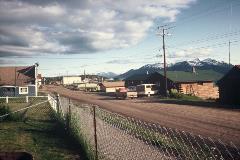
Court was held in the historic court house, with a judge from Vancouver, a prosecutor from Dawson Creek, BC, and a probation officer from Terrace, BC. The probation officer was a favourite, as he always brought a cooler full of fresh veggies.
Spring was short, wet, and muddy; the fall short, frosty, and pretty. Summer days were long and warm – never hot. Late June at midnight, you could sit outside and read a book as twilight dark came about 1 a.m., yielding to daylight by 4 a.m. You would see homes with a window or two covered by tinfoil– the kids’ bedrooms!
Snow came by Halloween, the lake froze by Christmas and thawed by the May long weekend. January 1982 was bitter cold – never above -40; ice fog was common.
I was on call 24/7, 365. My work entailed the usual policing; it seemed there was one of everything: thefts, break-ins, crashes, frauds, customs work, domestics, assaults, missing persons, death by misadventure, a murder, but no bank, so no bank robberies. I assisted the conservation officer when there was one, or filled in when there wasn’t.
Helicopter and boat patrols were made to wilderness locations when required. Atlin is relatively bug-free due to lake breezes, but going into the bush was entirely another matter.
On patrol, I would drop in to mining sites for a coffee, frequently noting jars or tins of gold on the table or shelves. Miners often came to my office with tins full of gold for safekeeping. We would weigh them and secure the lids with RCMP security tape (both of us would sign) then I issued a receipt before storing the tins in a safe.
Atlin is designated as free range (livestock/horses roam freely); fences were built to keep them out, not in. At times, the detachment lawn was prime grazing, leading some to wonder if the RCMP was still mounted.

Court was held in the historic court house, with a judge from Vancouver, a prosecutor from Dawson Creek, BC, and a probation officer from Terrace, BC. The probation officer was a favourite, as he always brought a cooler full of fresh veggies.
Spring was short, wet, and muddy; the fall short, frosty, and pretty. Summer days were long and warm – never hot. Late June at midnight, you could sit outside and read a book as twilight dark came about 1 a.m., yielding to daylight by 4 a.m. You would see homes with a window or two covered by tinfoil– the kids’ bedrooms!
Snow came by Halloween, the lake froze by Christmas and thawed by the May long weekend. January 1982 was bitter cold – never above -40; ice fog was common.
I was on call 24/7, 365. My work entailed the usual policing; it seemed there was one of everything: thefts, break-ins, crashes, frauds, customs work, domestics, assaults, missing persons, death by misadventure, a murder, but no bank, so no bank robberies. I assisted the conservation officer when there was one, or filled in when there wasn’t.
Helicopter and boat patrols were made to wilderness locations when required. Atlin is relatively bug-free due to lake breezes, but going into the bush was entirely another matter.
On patrol, I would drop in to mining sites for a coffee, frequently noting jars or tins of gold on the table or shelves. Miners often came to my office with tins full of gold for safekeeping. We would weigh them and secure the lids with RCMP security tape (both of us would sign) then I issued a receipt before storing the tins in a safe.
Dollar bills circulated in town for a long time gradually becoming faded, velvet-soft, and worn. The liquor store and post office would keep old bills, turning them in to a Whitehorse bank for replacements.
On one occasion, a police plane that had made stops at other detachments en route brought in a replacement officer and took us out for holidays. Our elder daughter has never forgotten the “passenger” in a body bag on the floor beside her seat.
On one occasion, a police plane that had made stops at other detachments en route brought in a replacement officer and took us out for holidays. Our elder daughter has never forgotten the “passenger” in a body bag on the floor beside her seat.

The “Mountie’s wife” spent more time in Atlin than the officers did, as we would have to go back for court or elsewhere for various reasons. My wife would feed prisoners, and answer the radio, phone, and the door during my patrols. When she was out and about, people would tell her things they did not wish to tell “the Mountie,” but knew full well that it would get to me. They told us what we needed to know. Things would happen that did not seem to make sense, or no one “saw” anything. Later, in a roundabout way, the history of the players involved would be revealed and perspective gained. Northern rules.
The RCMP phased out one-man posts (Atlin went to three). Years later, to recognize the spouses’ many (and unpaid) contributions in isolated tiny posts, the force created and presented approximately 500 “Second Man” awards (a silver RCMP crested broach with a Second Man ribbon). My wife’s was presented by the RCMP’s BC Commander at a formal ceremony at the provincial headquarters.
It is said about Atlin and the North: “When times are good, you don’t want to leave, but when times are bad, you can’t afford to!” After many adventures, our Atlin time was up in the summer of 1983. From the sublime to the ridiculous; I was posted to Vancouver. ■
You might also be interested in...
Business Owners
The most overlooked area of financial planning for business owners and incorporated professionals is the lack of integration between corporate and personal assets. When the majority of your assets are in your corporation you need very specific, specialized and personalized financial advice.
Learn More
Popular Categories
Search Insights
Book a meeting
Schedule a meeting with an RGF Advisor.

